Charles E W Bean, Diaries, AWM38 3DRL 606/250/1 - 1917 - 1937 - Part 9
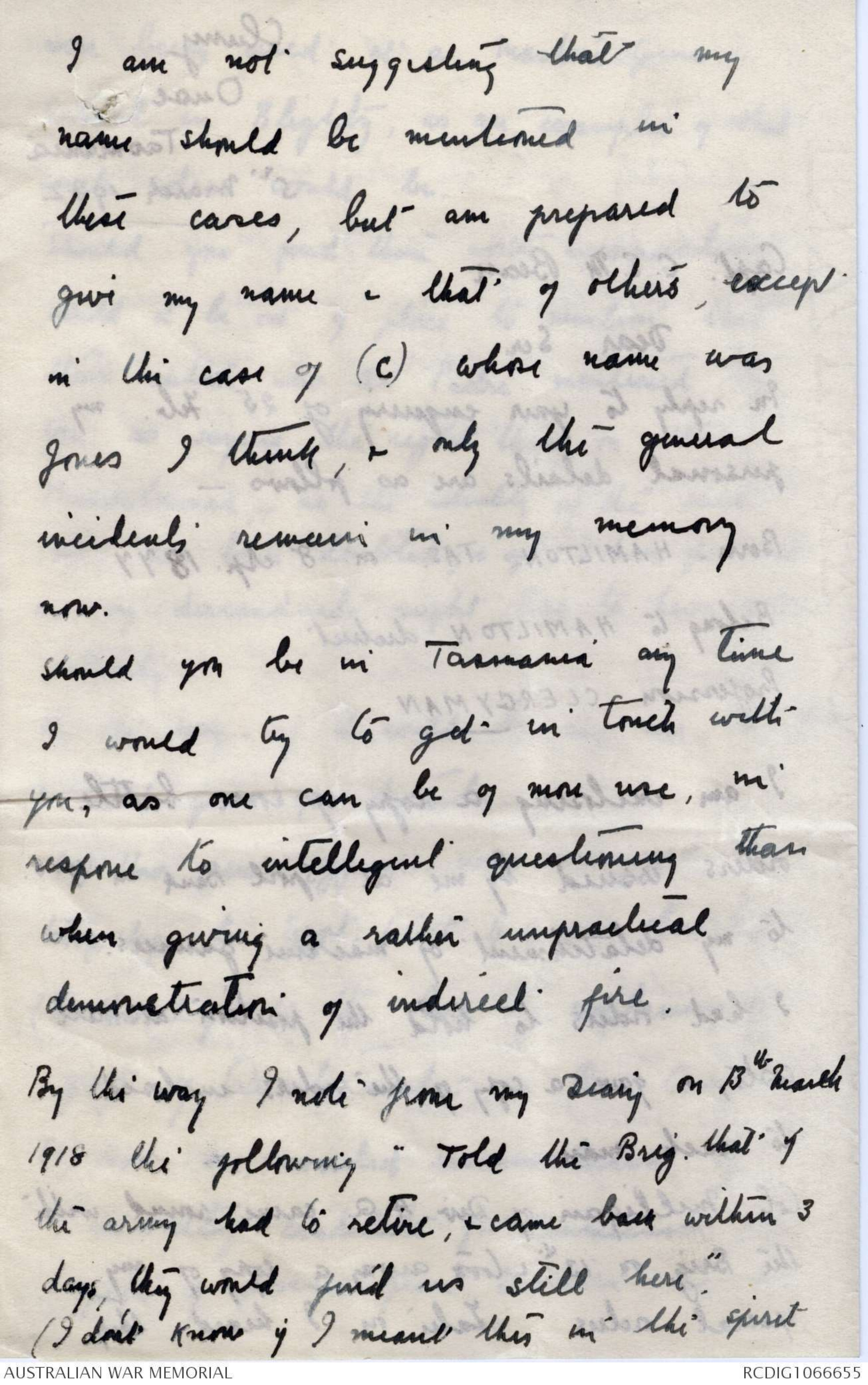
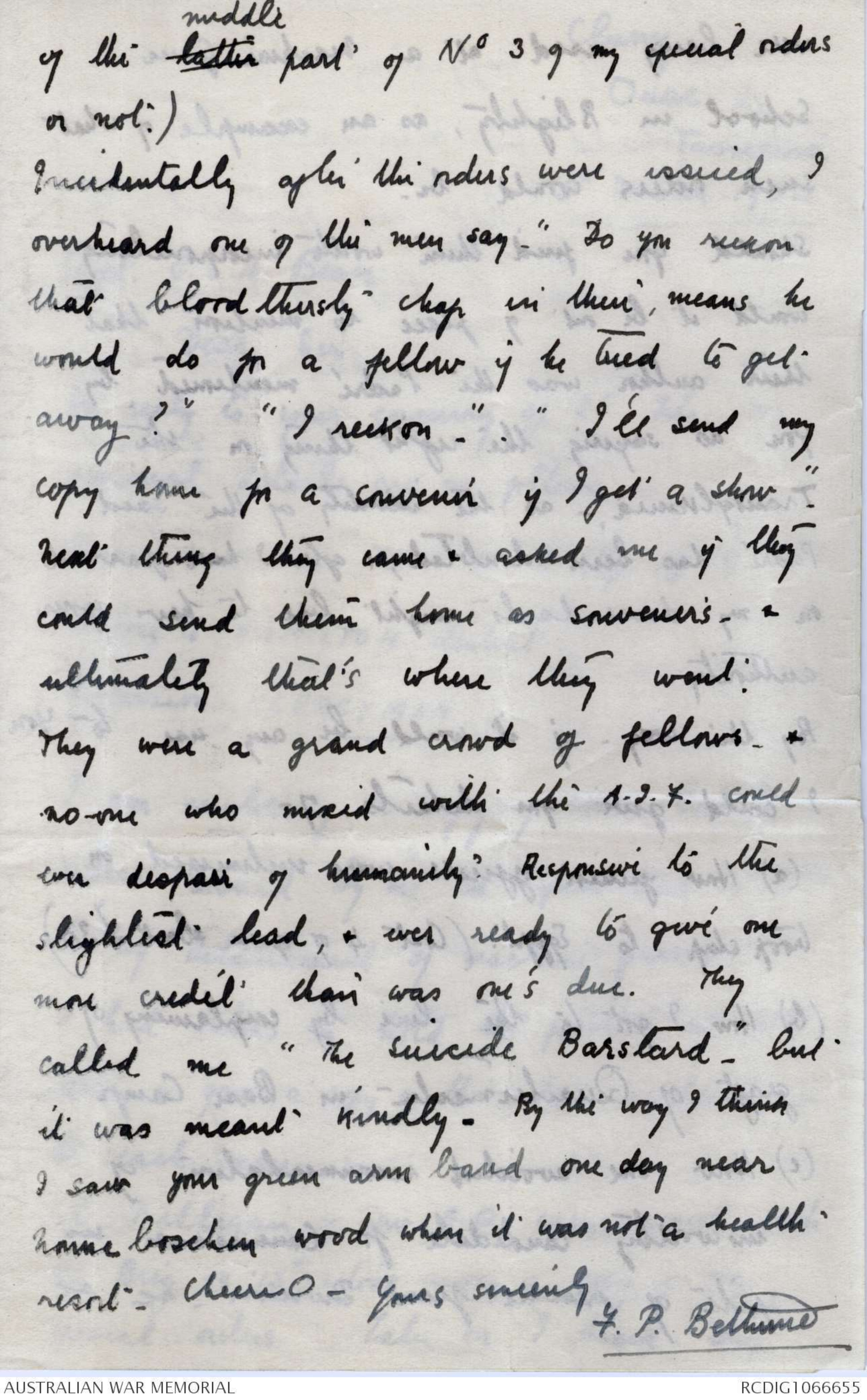
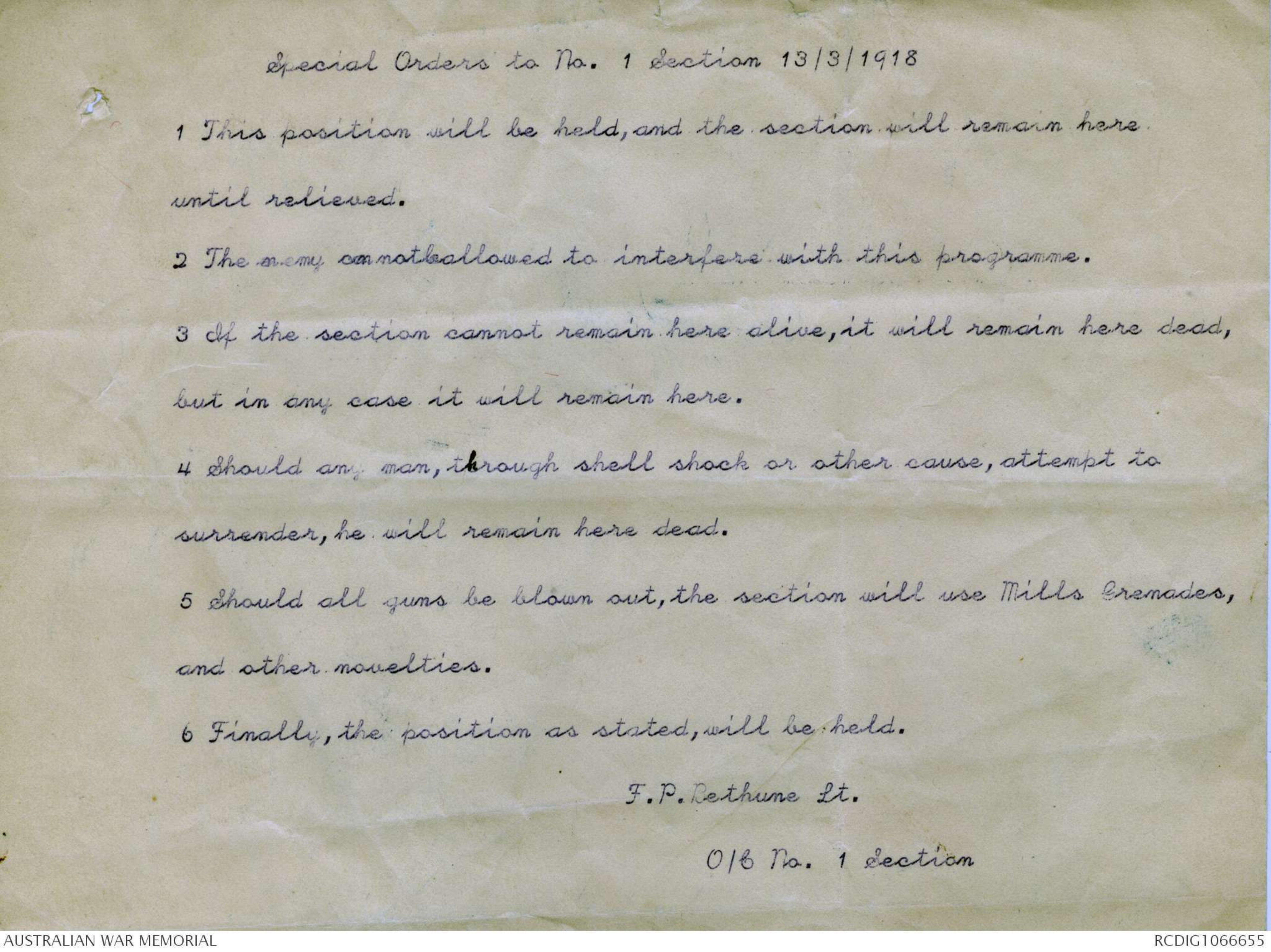
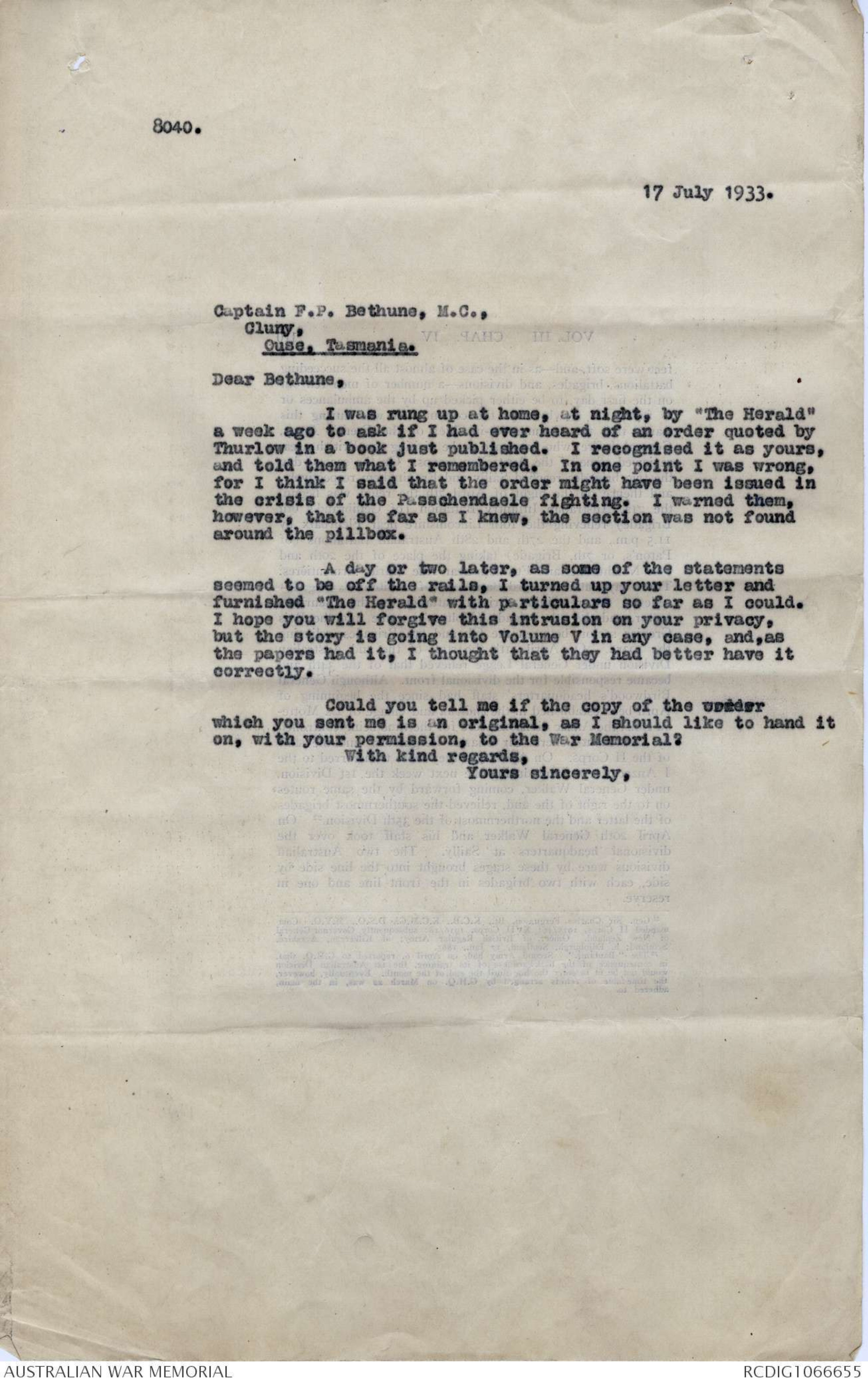
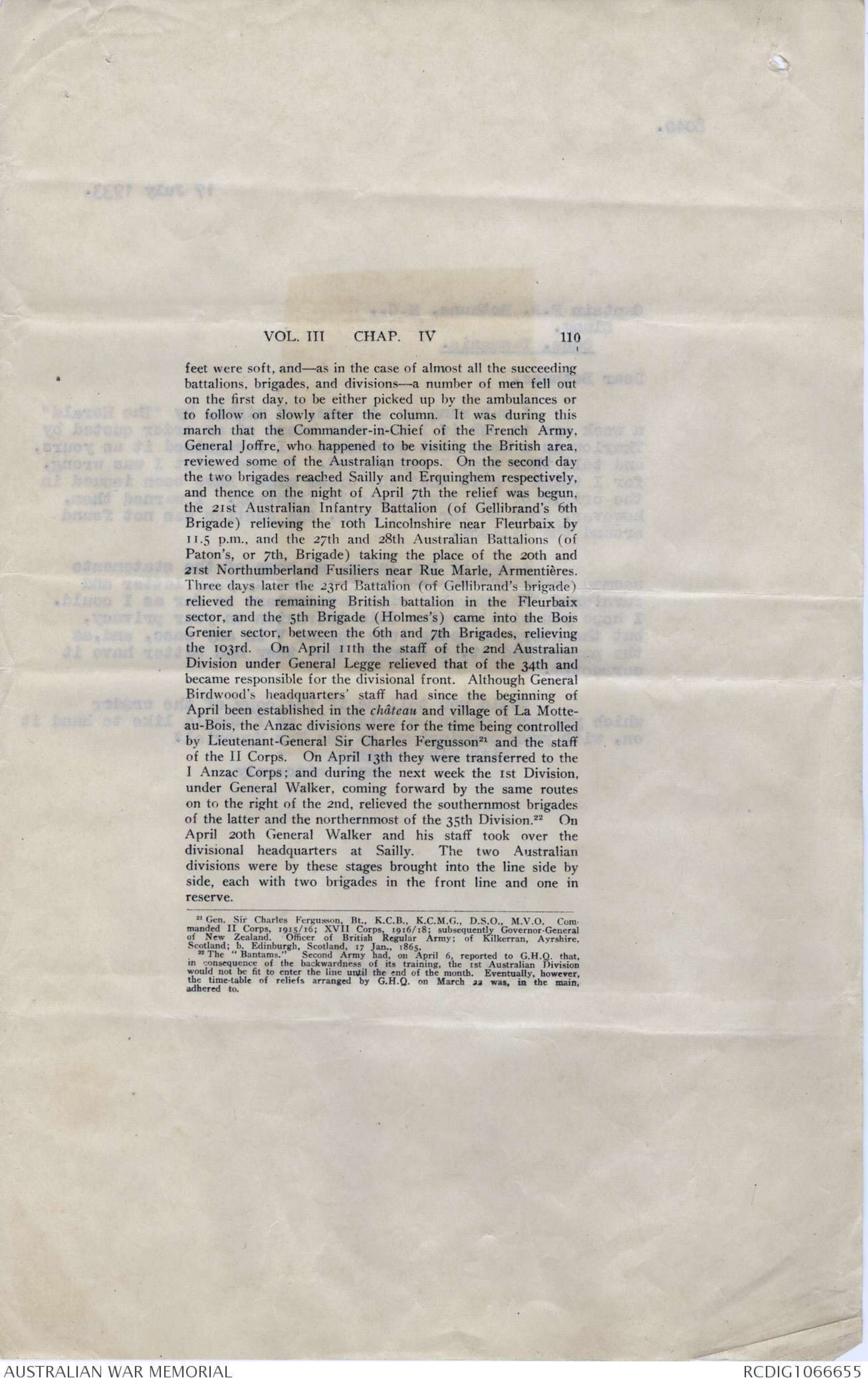
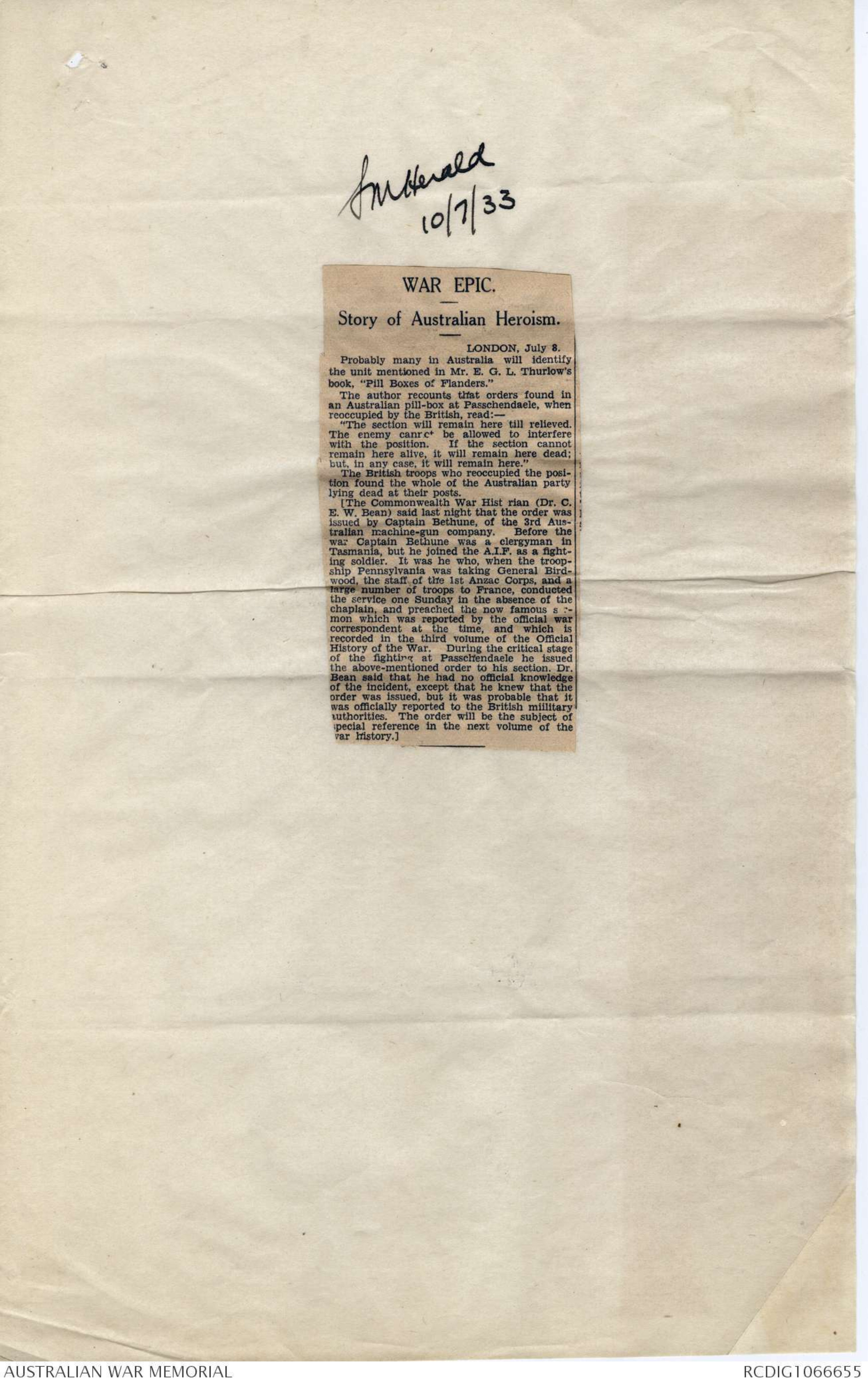
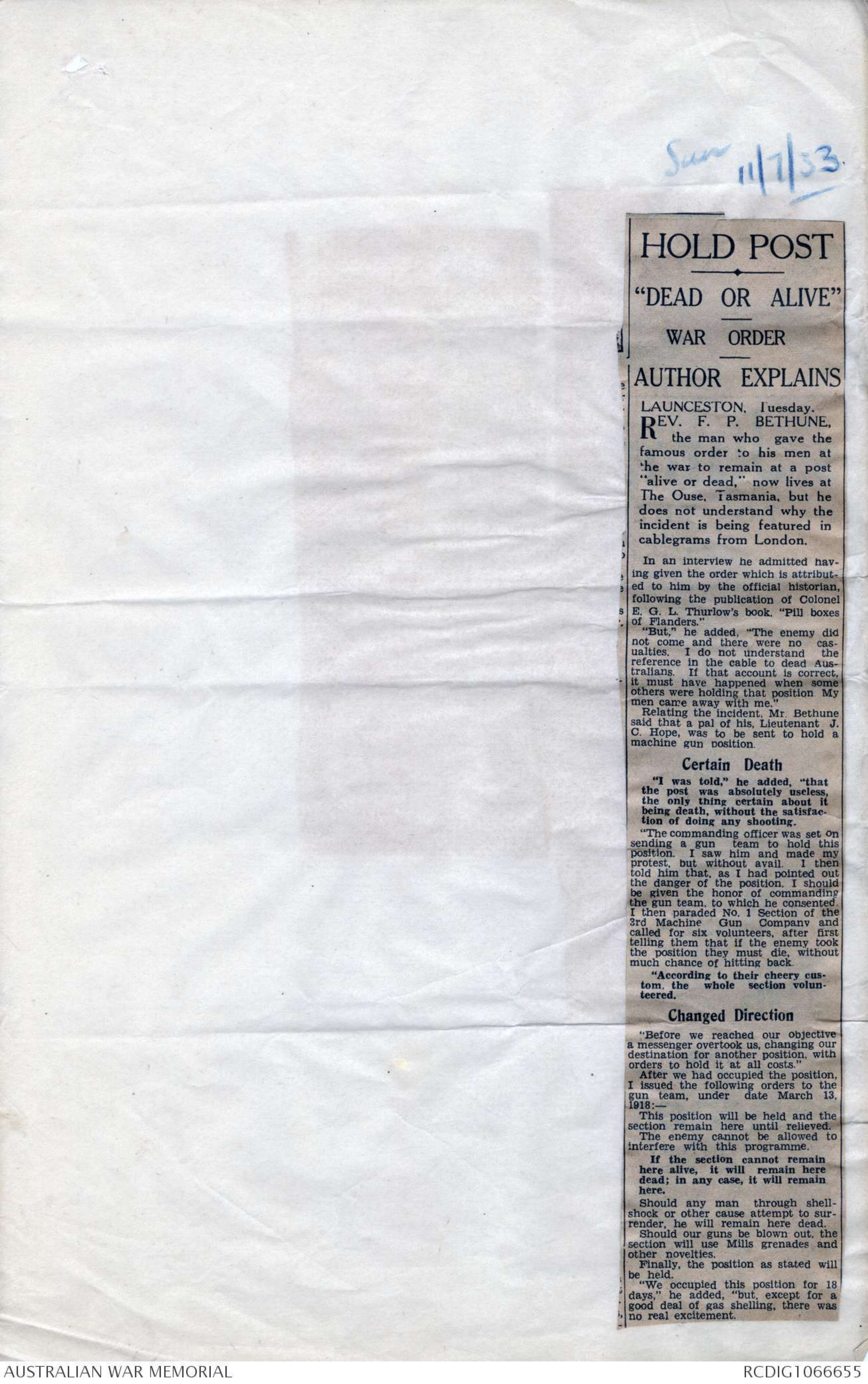
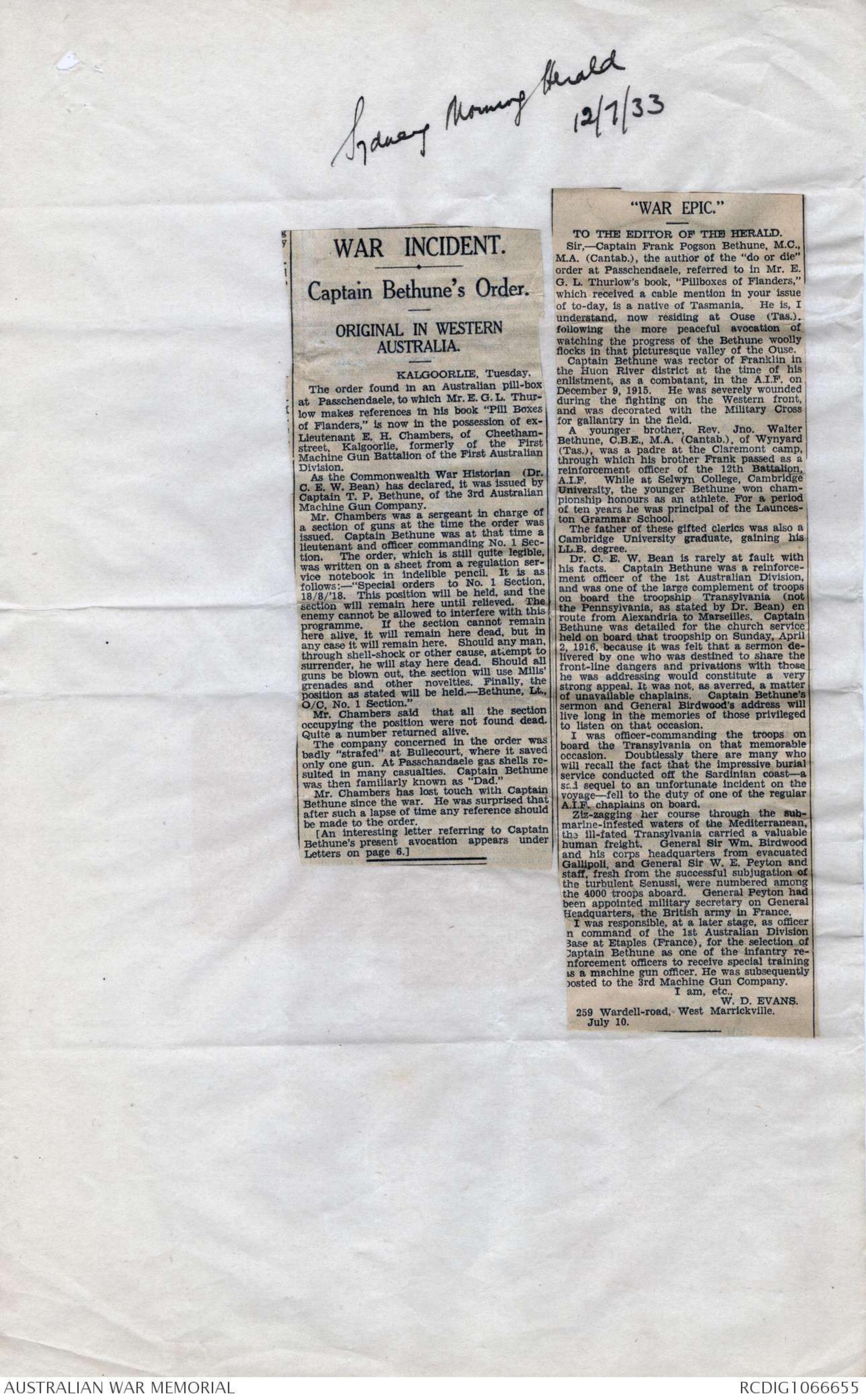
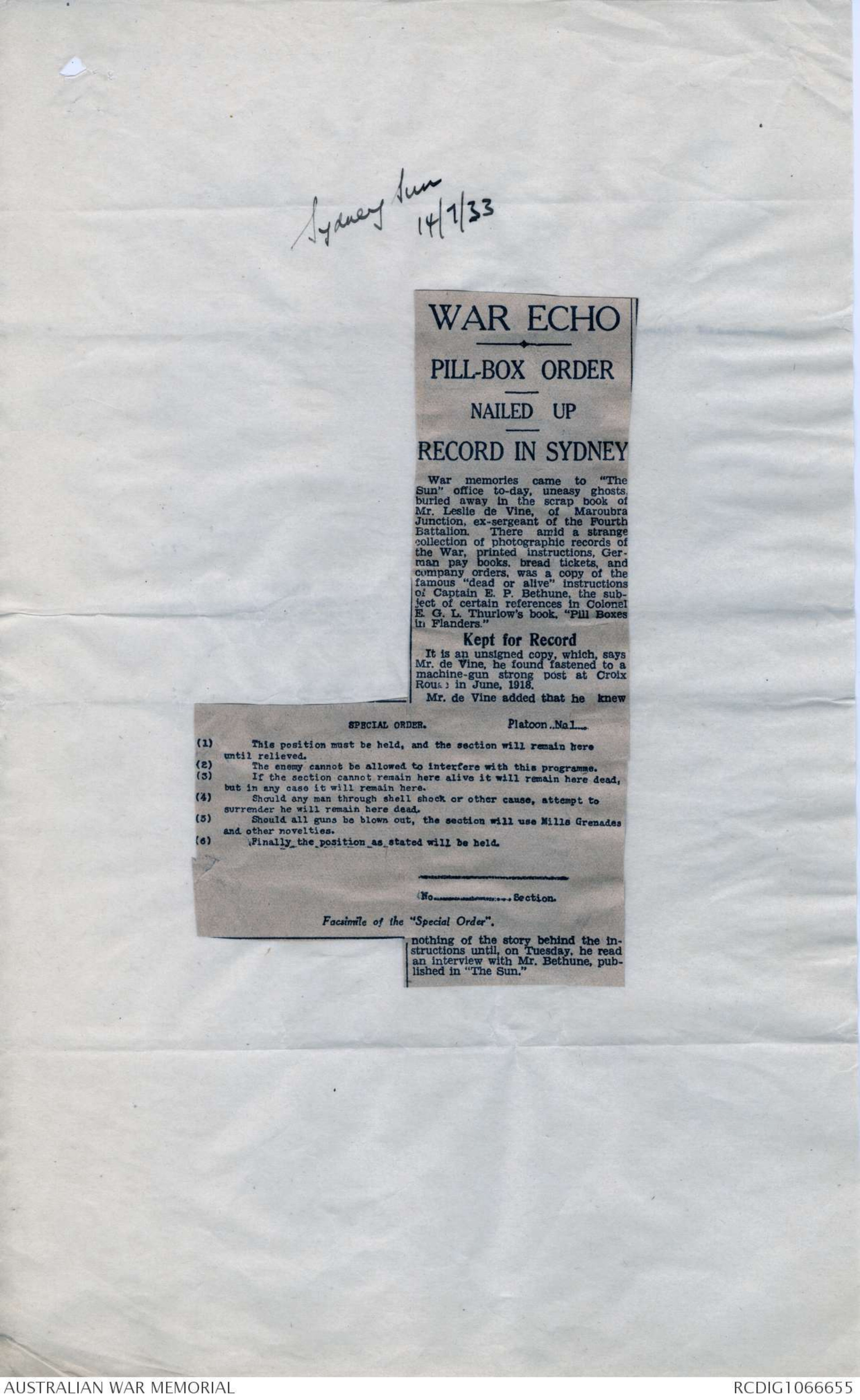
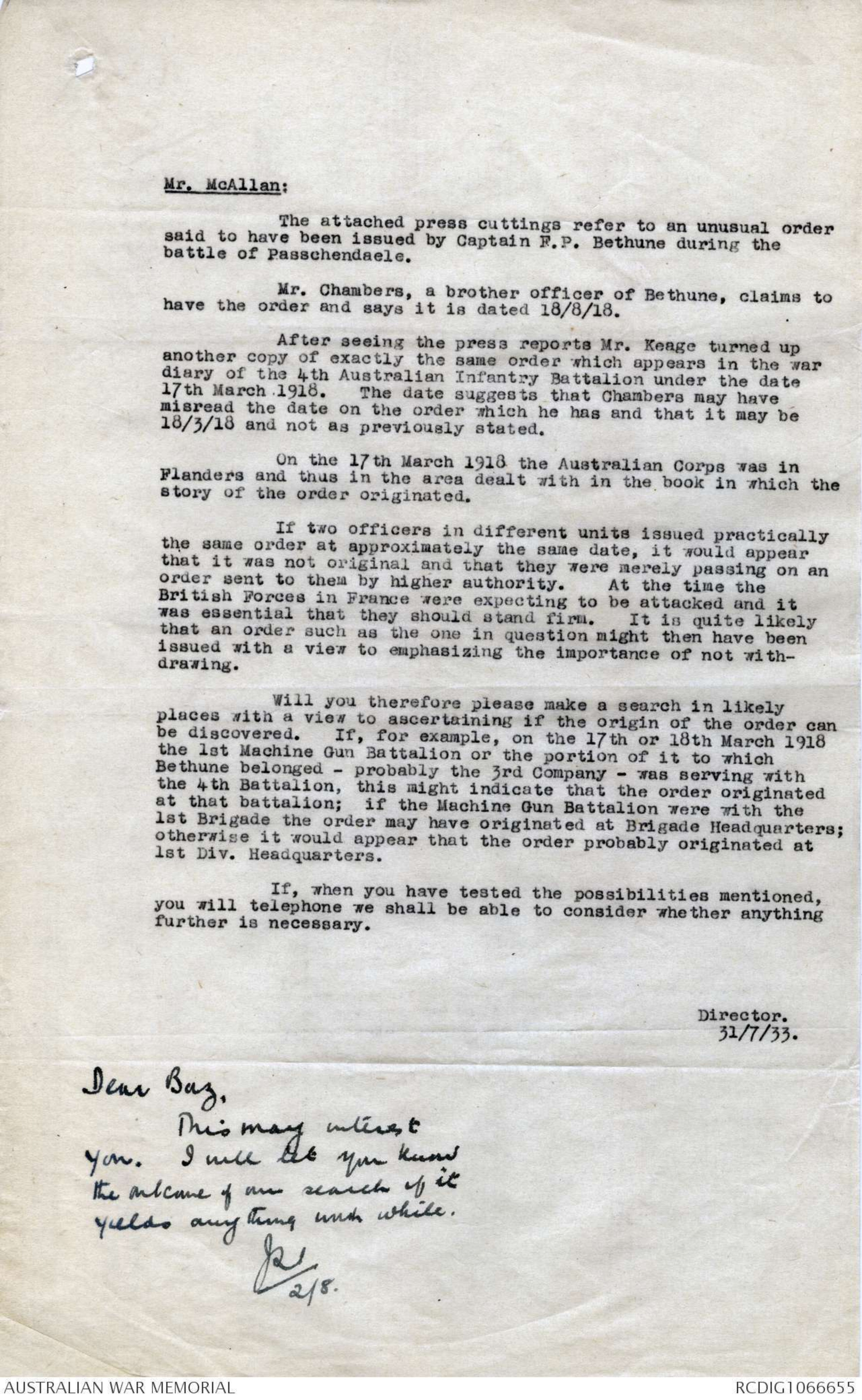
I am not suggesting that my
name should be mentioned in
these cases, but am prepared to
give my name & that of others except
in the case of (c) whose name was
Jones I think, & only the general
incidents remain in my memory
now.
Should you be in Tasmania any time
I would try to get in touch with
you, as one can be of more use, in
response to intelligent questioning than
when giving a rather impractical
demonstration of indirect fire.
By the way I note from my Diary on 13th March
1918 the following "Told the Brig. that if
the army had to retire, & came back within 3
days, they would find us still here."
(I don't know if I meant this in the spirit
of the latter middle part of No 3 of my special orders
or not.)
Incidentally after the orders were issued, I
overheard one of the men say "Do you reckon
that blood thirsty chap in there, means he
would do for a fellow if he tried to get
away?" "I reckon" "I'll send my
copy home for a souvenir if I get a show."
next thing they came & asked me if they
could send them home as souvenirs &
ultimately that's where they went.
They were a grand crowd of fellows - &
no one who mixed with the A.I.F. could
ever despair of humanity? Responsive to the
slightest lead, & were ready to give one
more credit than was one's due. They
called me "The Suicide Barstard" - but
it was meant kindly - By the way I think
I saw your green arm band one day near
Nonneboschen wood when it was not a health
resort. Cheerio - Yours sincerely
F.P. Bethune
Special Orders to M. 1 Section 13/3/1918
1 This position will be held, and the section will remain here
until relieved.
2 The enemy cannot be allowed to interfere with this programme.
3 If the section cannot remain here alive, it will remain here dead,
but in any case it will remain here.
4 Should any man, through shell shock or other cause, attempt to
surrender, he will remain here dead.
5 Should all guns be blown out, the section will use Mills Grenades,
and other novelties.
6 Finally, the position as stated, will be held.
F.P. Bethune Lt.
O/C No. 1 section
8040.
17 July 1933.
Captain F.P. Bethune, M.C.,
Cluny
Ouse. Tasmania
Dear Bethune,
I was rung up at home, at night, by "The Herald"
a week ago to ask if I had ever heard of an order quoted by
Thurlow in a book just published. I recognised it as yours,
and told them what I remembered. In one point I was wrong,
for I think I said that the order might have been issued in
the crisis of the Passchendaele fighting. I warned them,
however, that so far as I knew, the section was not found
around the pillbox.
A day or two later, as some of the statements
seemed to be off the rails, I turned up your letter and
furnished "The Herald" with particulars so far as I could.
I hope you will forgive this intrusion on your privacy,
but the story is going into Volume V in any case, and, as
the papers had it, I thought that they had better have it
correctly.
Could you tell me if the copy of the order
which you sent me is an original, as I should like to hand it
on, with your permission, to the War Memorial?
With kind regards
Yours sincerely,
VOL. III CHAP. IV
110
feet were soft, and—as in the case of almost all the succeeding
battalions, brigades, and divisions—a number of men fell out
on the first day, to be either picked up by the ambulances or
to follow on slowly after the column. It was during this
march that the Commander-in-Chief of the French Army,
General Joffre, who happened to be visiting the British area,
reviewed some of the Australian troops. On the second day
the two brigades reached Sailly and Erquinghem respectively,
and thence on the night of April 7th the relief was begun,
the 21st Australian Infantry Battalion (of Gellibrand's 6th
Brigade) relieving the 10th Lincolnshire near Fleurbaix by
11.5 p.m., and the 27th and 28th Australian Battalions (of
Paton's, or 7th, Brigade) taking the place of the 20th and
21st Northumberland Fusiliers near Rue Marle, Armentieres.
Three days later the 23rd Battalion (of Gellibrand's brigade)
relieved the remaining British battalion in the Fleurbaix
sector, and the 5th Brigade (Holmes's) came into the Bois
Grenier sector, between the 6th and 7th Brigades, relieving
the 103rd. On April 11th the staff of the 2nd Australian
Division under General Legge relieved that of the 34th and
became responsible for the divisional front. Although General
Birdwood's headquarters’ staff had since the beginning of
April been established in the chateau and village of La Motte
au-Bois, the Anzac divisions were for the time being controlled
by Lieutenant-General Sir Charles Fergusson and the staff
of the II Corps. On April 13th they were transferred to the
1 Anzac Corps; and during the next week the 1st Division,
under General Walker, coming forward by the same routes
on to the right of the and, relieved the southernmost brigades
of the latter and the northernmost of the 35th Division22 On
April 20th General Walker and his staff took over the
divisional headquarters at Sailly. The two Australian
divisions were by these stages brought into the line side by
side, each with two brigades in the front line and one in
reserve.
21 Gen. Sir Charles Fergusson Bt., K.C.B., K.C.M.G., D.S.O., M.V.O.,
Commanded 11 Corps,1915/16; XV11 Corps, 1916/18; subsequently
1915/16; XVII Corps, 1016/18; subsequently Governor General
of New Zealand
Officer of British Regular Army; of Kilkerran, Ayrshire,
b. Edinburgh, Scotland, 17 Jan., 1865.
22 The "Bantams" Second Army had, on April 6, reported to G.H.Q. that.
in consequence of the backwardness of its training, the 1st Australian Division
would not be fit to enter the line until the end of the month. Eventually, however,
the time table of reliefs arranged by G.H.Q. on March 22 as was, in the main,
adhered to.
S M Herald
10/7/33
WAR EPIC.
Story of Australian Heroism.
LONDON, July 8.
Probably many in Australia will identify
the unit mentioned in Mr. E. G. L. Thurlow's
book, "Pill Boxes of Flanders."
The author recounts that orders found in
an Australian pill-box at Passchendaele, when
reoccupied by the British, read:—
"The section will remain here till relieved.
The enemy cannot be allowed to interfere
with the position. If the section cannot
remain here alive, it will remain here dead
but, in any case, it will remain here."
The British troops who reoccupied the position
found the whole of the Australian party
lying dead at their posts.
[The Commonwealth War Historian (Dr. C.
E. W. Bean) said last night that the order was
issued by Captain Bethune, of the 3rd Australian
machine-gun company. Before the
war Captain Bethune was a clergyman in
Tasmania, but he joined the A.I.F. as a fighting
soldier. It was he who, when the troopship
Pennsylvania was taking General Birdwood,
the staff of the 1st Anzac Corps, and a
large number of troops to France, conducted
the service on Sunday in the absence of the
chaplain and preached the now famous sermon
which was reported by the official war
correspondent at the time, and which is
recorded in the third volume of the Official
History of the War. During the critical stage
of the fighting at Passchendaele he issued
the above-mentioned order to his section. Dr.
Bean said that he had no official knowledge
of the incident except that he knew that the
order was issued, but it was probable that it
was officially reported to the British Military
authorities. The order will be the subject of
special reference in the next volume of the
War History.}
Sun
11/7/33
HOLD POST
DEAD OR ALIVE
WAR ORDER
AUTHOR EXPLAINS
LAUNCESTON Tuesday.
REV. F. P. BETHUNE.
the man who gave the
famous order to his men at
the war to remain at a post
"alive or dead," now lives at
The Ouse. Tasmania, but he
does not understand why the
incident is being featured in
cablegrams from London.
In an interview he admitted having
given the order which is attributed
to him by the official historian,
following the publication of Colonel
E. G. L. Thurlow's book "Pill boxes
of Flanders."
"But," he added, "The enemy did
not come and there were no
casualties. I do not understand the
reference in the cable to dead
Australians. If that account is correct
it must have happened when some
others were holding that position My
men came away with me."
Relating the incident, Mr. Bethune
said that a pal of his, Lieutenant J.
C. Hope, was to be sent to hold a
machine gun position.
Certain Death
"I was told," he added, "that
the post was absolutely useless,
the only thing certain about it
being death, without the satisfaction
of doing any shooting.
"The commanding officer was set on
sending a gun team to hold this
position. I saw him and made my
protest, but without avail. I then
told him that, as I had pointed out
the danger of the position. I should
be given the honor of commanding
the gun team, to which he consented.
I then paraded No. 1 Section of the
3rd Machine Gun Company and
called for six volunteers, after first
telling them that if the enemy took
the position they must die, without
much chance of hitting back.
"According to their cheery custom,
the whole section volunteered.
Changed Direction
"Before we reached our objective
a messenger overtook us, changing our
destination for another position, with
orders to hold it at all costs."
After we had occupied the position,
I issued the following orders to the
gun team, under date March 13.
1918:-
This position will be held and the
section remain here until relieved.
The enemy cannot be allowed to
interfere with this programme.
If the section cannot remain
here alive, it will remain here
dead; in any case, it will remain
here.
Should any man through shell-shock
or other cause attempt to surrender,
he will remain here dead.
Should our guns be blown out, the
section will use Mills grenades and
other novelties.
Finally, the position as stated will
held.
"We occupied this position for 18
days", he added, "but except for a
good deal of gas shelling, there was
no real excitement.
Sydney Morning Herald
12/7/33
WAR INCIDENT.
Captain Bethune's Order
ORIGINAL IN WESTERN
AUSTRALIA
KALGOORLIE, Tuesday.
The order found in an Australian pill-box
at Passchendaele, to which Mr. E.G.L. Thurlow
makes references in his book "Pill Boxes
of Flanders," is now in the possession of
ex-Lieutenant E. H. Chambers of Cheetham
street, Kalgoorlie, formerly of the First
Machine Gun Battalion of the First Australian
Division.
As the Commonwealth War Historian (Dr.
C.E. W. Bean) has declared, it was issued by
Captain T. P. Bethune of the 3rd Australian
Machine Gun Company.
Mr Chambers was sergeant in charge of
a section of guns at the time the order was
issued. Captain Bethune was at that time a
lieutenant and officer commanding No. 1 Section.
The order, which is still quite legible,
was written on a sheet from regulation service
notebook in indelible pencil. It is as
follows:- "Special orders to No.1 Section
18/8/'18. This position will be held, and the
section will remain here until relieved. The
enemy cannot be allowed to interfere with this
programme. If the section cannot remain
here alive, it will remain here dead, but in
any case it will remain here. Should any man,
through shell-shock or other cause, attempt to
surrender, he will stay here dead. Should all
guns be blown out, then section will use Mills'
grenades and other novelties. Finally, the
position as stated will be held.- Bethune, Lt.,
O/C, No. 1 Section."
Mr Chambers said that all the section
occupying the position were not found dead.
Quite a number returned alive.
The company concerned in the order was
badly "strafed" at Bullecourt, where it saved
only one gun. At Passchandaele gas shells resulted
in many casualties. Captain Bethune
was then familiarly known as "Dad".
Mr Chambers has lost touch with Captain
Bethune since the war. He was surprised that
after such a lapse of time any reference should
be made to the order.
[An interesting letter referring to Captain
Bethune's present avocation appears under
Letters on page 6.}
"WAR EPIC"
TO THE EDITOR OF THE HERALD.
Sir, - Captain Frank Pogson Bethune, M.C.
M.A. (Cantab.), the author of the "do or die"
order at Passchendaele, referred to in Mr. E.
G. L. Thurlow's book, "Pillboxes of Flanders,"
which received a cable mention in your issue
of to-day, is a native of Tasmania. He is, I
understand, now residing at Ouse (Tas.).
following the more peaceful avocation of
watching the progress of the Bethune woolly
flocks in that picturesque valley of the Ouse.
Captain Bethune was rector of Franklin in
the Huon River district at the time of his
enlistment, as a combatant, in the A.I.F. on
December 9, 1915. He was severely wounded
during the fighting on the Western front
and was decorated with the Military Cross
for gallantry in the field.
A younger brother, Rev. Jno. Walter
Bethune, C.B.E., M.A. (Cantab.), of Wynyard
(Tas.), was a padre at the Claremont camp,
through which his brother Frank passed as a
reinforcement officer of the 12th Battalion,
A.IF. While at Selwyn College, Cambridge
University, the younger Bethune won championship
honours as an athlete. For a period
of ten years he was principal of the Launceston
Grammar School.
The father of these gifted clerics was also a
Cambridge University graduate, gaining his
LL.B. degree.
Dr. C. E. W. Bean is rarely at fault with
his facts. Captain Bethune was a reinforcement
officer of the 1st Australian Division,
and was one of the large complement of troops
on board the troopship Transylvania (not
the Pennsylvania, as stated by Dr. Bean) enroute
from Alexandria to Marseilles. Captain
Bethune was detailed for the church service
held on board that troopship on Sunday, April
2, 1916, because it was felt that a sermon delivered
by one who was destined to share the
front-line dangers and privations with those
he was addressing would constitute a very
strong appeal. It was not, as averred, a matter
of unavailable chaplains. Captain Bethune's
sermon and General Birdwood's address will
live long in the memories of those privileged
to listen on that occasion.
I was officer-commanding the troops on
board the Transylvania on that memorable
occasion. Doubtlessly there are many who
will recall the fact that the impressive burial
service conducted off the Sardinian coast—a
sad sequel to an unfortunate incident on the
voyage—fell to the duty of one of the regular
A.I.F. chaplains on board
Ziz-zagging her course through the submarine
infested waters of the Mediterranean,
the ill-fated Transylvania carried a valuable
human freight. General Sir Wm. Birdwood
and his corps headquarters from evacuated
Gallipoli, and General Sir W. E. Peyton and
staff, fresh from the successful subjugation of
the turbulent Senussi, were numbered among
the 4000 troops aboard. General Peyton has
been appointed military secretary on General
Headquarters, the British army in France
I was responsible, at a later stage, as officer
in command of the lst Australian Division
Base at Etaples (France), for the selection of
Captain Bethune as one of the infantry
reinforcement officers to receive special training
is a machine gun officer. He was subsequently
posted to the 3rd Machine Gun Company.
I am, etc.,
W.D. EVANS.
259 Wardell-road,- West Marrickville.
July 10.
Sydney Sun
14/7/33
WAR ECHO
PILLBOX ORDER
NAILED UP
RECORD IN SYDNEY
War memories came to "The
Sun" office to day, uneasy ghosts
buried away in the scrap book of
Mr. Leslie de Vine, of Maroubra
Junction, ex-sergeant of the Fourth
Battalion. There amid a strange
collection of photographic records of
the War, printed instructions,
German pay books, bread tickets, and
company orders, was a copy of the
famous "dead or alive" instructions
(of Captain E. P. Bethune, the
subject of certain references in Colonel
E. G. L. Thurlow's book "PiIl Boxes
in Flanders."
Kept for Record
It is an unsigned copy, which, says
Mr. de Vine, he found fastened to a
machine-gun strong post at Croix
Rouse, in June, 1918
Mr. de Vine added that he knew
SPECIAL ORDER.
Platoon, No. 1.
(1) This position must be held, and the section will remain here
until relieved.
(2) The enemy cannot be allowed to interfere with this programme.
(3) If the section cannot remain here alive it will remain here dead,
but in any case it will remain here.
(4) Should any man through shell shock or other cause, attempt to
surrender he will remain here dead.
(5) Should all guns be blown out, the section will use Mills Grenades
and other novelties.
(6) Finally the position, as stated will be held.
No. Section.
Facsimile of the "Special Order".
nothing of the story behind the
instructions until, on Tuesday, he read
an interview with Mr. Bethune,
published in "The Sun."
Mr. McAllan:
The attached press cuttings refer to an unusual order
said to have been issued by Captain E.P. Bethune during the
battle of Passchendaele.
Mr. Chambers, a brother officer of Bethune, claims to
have the order and says it is dated 18/8/18.
After seeing the press reports Mr. Keage turned up
another copy of exactly the same order which appears in the war
diary of the 4th Australian Infantry Battalion under the date
17th March 1918. The date suggests that Chambers may have
misread the date on the order which he has and that it may be
18/3/18 and not as previously stated.
On the 17th March 1918 the Australian Corps was in
Flanders and thus in the area dealt with in the book in which the
story of the order originated.
If two officers in different units issued practically
the same order at approximately the same date, it would appear
that it was not original and that they were merely passing on an
order sent to them by higher authority. At the time the
British Forces in France were expecting to be attacked and it
was essential that they should stand firm. It is quite likely
that an order such as the one in question might then have been
issued with a view to emphasizing the importance of not withdrawing.
Will you therefore please make a search in likely
places with a view to ascertaining if the origin of the order can
be discovered. If, for example, on the 17th or 18th March 1918
the lst Machine Gun Battalion or the portion of it to which
Bethune belonged - probably the 3rd Company - was serving with
the 4th Battalion, this might indicate that the order originated
at that battalion; if the Machine Gun Battalion were with the
1st Brigade the order may have originated at Brigade Headquarters;
otherwise it would appear that the order probably originated at
1st Div. Headquarters.
If, when you have tested the possibilities mentioned,
you will telephone we shall be able to consider whether anything
further is necessary.
Director.
31/7/33.
Dear Baz.
This may interest
you. I will let you know
the outcome of our search if it
yields anything worth while.
JR
2/8
 Sandy Mudie
Sandy MudieThis transcription item is now locked to you for editing. To release the lock either Save your changes or Cancel.
This lock will be automatically released after 60 minutes of inactivity.